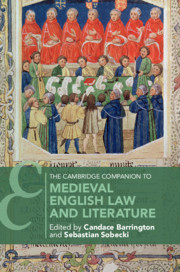Book contents
- The Cambridge Companion to Medieval English Law and Literature
- The Cambridge Companion to Medieval English Law and Literature
- Copyright page
- Contents
- Illustrations
- Contributors
- Abbreviations
- Preface
- Part I Legal Contexts
- 1 English Law before the Conquest
- 2 Languages and Law in Late Medieval England: English, French and Latin
- 3 Canon and Civil Law
- 4 Custom and Common Law
- 5 Magna Carta and Statutory Law
- 6 Treatises, Tracts and Compilations
- Part II Literary Texts
- Index
- References
3 - Canon and Civil Law
from Part I - Legal Contexts
Published online by Cambridge University Press: 26 July 2019
- The Cambridge Companion to Medieval English Law and Literature
- The Cambridge Companion to Medieval English Law and Literature
- Copyright page
- Contents
- Illustrations
- Contributors
- Abbreviations
- Preface
- Part I Legal Contexts
- 1 English Law before the Conquest
- 2 Languages and Law in Late Medieval England: English, French and Latin
- 3 Canon and Civil Law
- 4 Custom and Common Law
- 5 Magna Carta and Statutory Law
- 6 Treatises, Tracts and Compilations
- Part II Literary Texts
- Index
- References
Summary
The common culture of medieval Europe was derived from two main sources: the shared inheritance of the Roman classical past and the international character of the Western Church. Law was a major element in both these forces shaping European culture. This included civil law, the law of the ancient Roman Empire. It survived the Empire’s political collapse in the West through its codification in the Empire’s remaining eastern half under Emperor Justinian in the early sixth century. Only parts of this codification were known in the early medieval West, but it was rediscovered there in its entirety by the twelfth century. It became a subject of study in the emerging universities of medieval Europe, and this stimulated its growing international influence. It was an increasingly important source of ideas and rules for other medieval legal systems, notably canon law, the law of the Western Church. Canon law also had a long tradition going back to late antiquity, and the twelfth century was likewise decisive to its international reach and impact. No single collection of canon law enjoyed universal recognition comparable to Justinian’s codification till the appearance of Gratian’s Decretum in c. 1140. This canonical collection was rapidly adopted as the standard textbook for teaching canon law, which emerged as a subject of study alongside civil law in Western universities from the mid-twelfth century. Canon and civil law would remain the only law studied in medieval universities, but their pan-European significance was not limited to the classroom. From the twelfth century the Western Church developed an international system of courts to settle disputes and prosecute crimes under its jurisdiction in accordance with canon law. Civil law also influenced legal practice in these courts since from the late twelfth century it provided the basis for the so-called ‘Romano-canonical’ procedure followed in them. Canon and civil law thus touched people’s lives across later medieval Europe, not least since church courts exercised jurisdiction over major aspects of daily life, notably marriage.
- Type
- Chapter
- Information
- Publisher: Cambridge University PressPrint publication year: 2019



